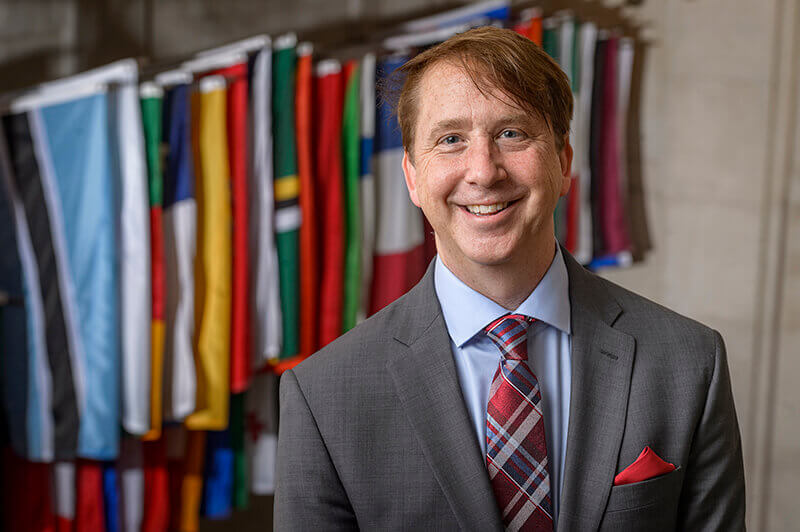April 27, 2018
Murphy Award: John Sundquist
 John Sundquist, associate professor of German and linguistics. (Purdue University photo/Alex Kumar)
Download image
John Sundquist, associate professor of German and linguistics. (Purdue University photo/Alex Kumar)
Download image
Five teachers have received the 2018 Outstanding Undergraduate Teaching Award in memory of Charles B. Murphy. This week, Purdue Today will feature Q&A’s on each of the recipients. This profile focuses on John Sundquist, associate professor of German and linguistics.
Years at Purdue: 15.
Teaching interests: I teach in a lot of different areas, depending on the needs of our students and the different programs that I am involved in. I teach linguistics courses on language change or on the history of German and Scandinavian languages, but also offer German language and culture courses at all levels. One of my favorite courses to teach is on beer and brewing in German culture.
Goals as a professor: To me, the most important goal is that students feel that the classroom is an environment in which they can challenge what they learn and be challenged to go beyond their immediate experience. I myself am a curious learner with a wide variety of academic interests, and I am always looking for connections across disciplines in what I learn and teach. If I can inspire students to take the same approach to their learning, I feel like I have succeeded in getting them going in the right direction. The rest is out there for them to discover beyond the classroom.
On the importance of researching historical linguistics of Germanic languages: To understand the role of language in society and the shape and form of a language today, with all of its intricacies and quirks, we need to look to the past to understand where it all came from. Historical linguists are able to get the big picture regarding so many aspects of language over the course of millennia. To understand a language today, it is crucial to also understand its history, how it was related to other languages, how the speakers of these languages interacted and came into contact with each other and how different factors have shaped its course. The Germanic language family offers an interesting testing ground. The closer we look through this kind of historical and comparative lens, the more we see the same forces at work and recurring patterns of change that can be applied to different language families at different times throughout history.
On the importance of bringing German-speaking members of the community together: German has been one of the few languages that has been offered at Purdue since its founding back in the 19th century. We have worked to keep that tradition going strong in many ways. We have weekly coffee hours for students, faculty and members of the community to come practice German and learn more about language and culture. We also offer a widely popular German movie night series that is open to the public, and I have set up my classes to do a German short film festival that is open to the public, as well. These events are important for everyone because they bring us all together to learn about fascinating similarities and differences among cultures.
What motivates Sundquist to develop study abroad courses for students: One of the courses that I offer on beer and brewing in German culture attracts students from a wide variety of disciplines, including engineering, biology, chemistry, history, religious studies and more. I love to see how these students interact in the classroom, learning both with and from each other. Over the last few years, I have developed this material into an online course to reach out to students beyond the classroom, and the plan is to turn this into a hybrid online summer study abroad course in Germany. The way I see it, study abroad is more important today than ever before. Studying overseas is fundamentally transformative and provides students with greatly improved linguistic competence, cross-cultural understanding and advanced critical thinking skills.
How Sundquist’s interaction with students is rewarding: It is awesome to see all of the amazing ways that our students learn and how they navigate through various challenges. We all learn in slightly different ways. Some students are visual learners, while others appreciate talking things out in groups. It is only through interaction with students that I can explore different options and strategies to see how each student can best build on their own unique skillset to engage effectively with the material. Perhaps the most rewarding part of this experience is to hear a student say, “I have never thought of it that way before.”
On winning the Murphy Award: I am in awe of all of the past recipients of this award and am humbled to be a part of this amazing group. It is especially meaningful to me that students nominate the winners of this award and help in the selection process. It is an honor to even be nominated, and it is one of the highlights of my career to be selected.
What his students say: Professor Sundquist does an excellent job of educating his students. He comes up with interactive activities which include the whole class and truly makes learning enjoyable for his students. … Given the opportunity, I always enroll in Professor Sundquist’s classes because I love his teaching style and know that I will actually learn and remember the material. … He does not just lecture at us for 75 minutes, but instead uses a variety of methods to keep us engaged.
Writer: Olivia Crouse, ocrouse@purdue.edu

